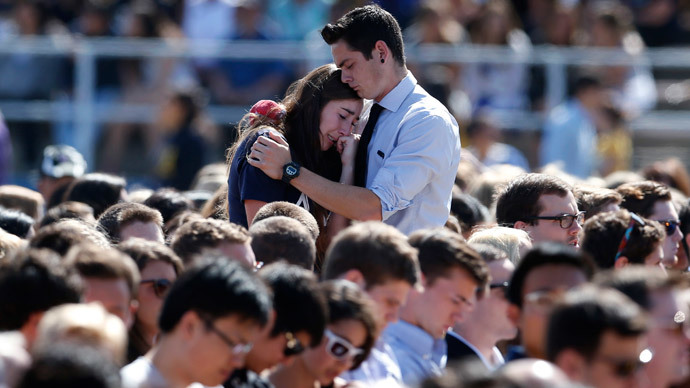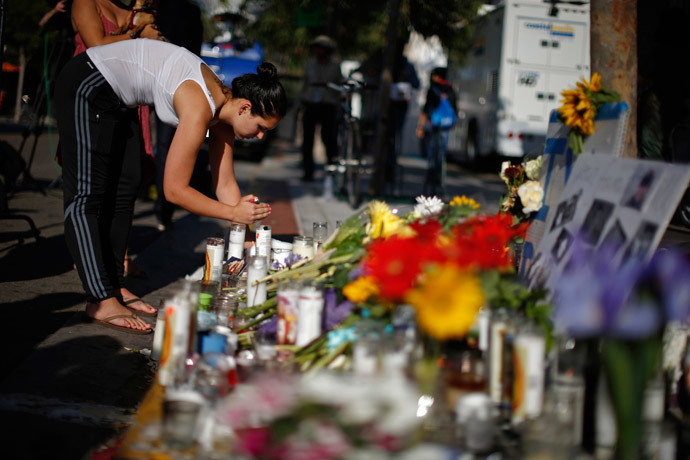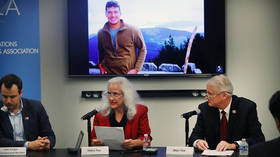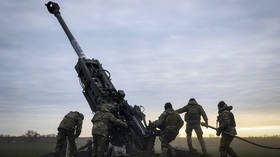US gun violence: Product of poisoned society and normalization of inhumanity

Another week and another random mass shooting in the United States – this time it involved a 22 year old English-born student in the affluent college town of Santa Barbara in California.
Elliot Rogers posted a macabre seven-minute video of himself setting out his motives, and then proceeded to kill seven people, including himself.
The fact that Rogers, was white and the product of a privileged upbringing - his father is a Hollywood movie director - refutes the notion that America’s problem with gun violence is bound up with gangs and the gang culture that predominates in low income, minority communities.
In the wake of this latest massacre, attention has been focused on the nation’s lax gun laws and what can be done to try to prevent more massacres from taking place in a country where such incidents occur on a regular basis. And as ever the debate has centered on the association of the right to bear arms with freedom, and the inviolability (or not) of the Constitution's Second Amendment, which enshrines the right in law.
This reasoning is reductive in the extreme when it comes to the problem of gun violence in a nation where mothers cannot be sure their kids will come home alive after dropping them off at school in the morning. The more important and relevant issue is the nation's fixation with violence and the over emphasis on material success and status that makes life in America akin to an all-or-nothing struggle of all against all.
US culture is steeped in the ethos of the winner, the muscular over-achiever who rises to the top by dint of a mammoth capacity for studying, work, and risk taking. Words such as compassion, empathy, co-operation, kindness, consideration are the words of weak people and by extension a weak nation. In America you don't get what you deserve, you get what you take, and in order to take you have to be more ruthless, competitive, dedicated, committed, and smarter than the other guy. The rewards for success are limitless, while the penalty for failure is severe.

This after all is a nation in which over 40 million people live in poverty and where the level of inequality between rich and poor is greater than it was during the days of the Roman Empire. And just like Rome, US power and influence stretches to every corner of the globe and is sustained by its capacity for violence and destruction on a grand scale.
A nation founded on the genocide of the indigenous population, the US was built on the foundation of human slavery, while sustained by the lie that freedom and a capacity for violence are two sides of the same coin. Hollywood conveys this message in a diet of movies in which violence and danger are ever present conditions of human existence.
Meanwhile, on television, a plethora of cop shows and crime dramas, many of them painstakingly procedural, paint a picture of a dystopian world in which the ‘bad guys’ are out there ready to pounce – a world in which the weak are constantly preyed upon and where everyone is a potential adversary.
The disconnect that exists between the myth of America and the reality is concealed by a corporate media that has poisoned the level of political and intellectual debate. Here we see the impact of the overarching influence of various business lobbies, including the gun lobby, in portraying politics as a fight to the death between the good guys and the bad guys: those who want to protect the freedoms and rights of Americans, including the right to own assault weapons, and those who want to take them away. The rugged individual, the frontier spirit, these and the aforementioned myths underpin a society in which extreme wealth and greed sits comfortably with an overweening and nauseating bible fetish that plumbs new depths of hypocrisy and affectation.
What motivated the 22-year-old son of a wealthy and successful Hollywood movie director to take the lives of six innocent people, picked out at random, was alienation and rage over his inability to connect with girls. The sense of entitlement involved in such a warped mindset involves cultural and environmental factors. Dismissing Elliot Rogers as a ‘nut’ or a misogynist is simply not enough to explain it, just as it fails to get to the root cause of the many other mass shootings that have occurred across the United States in the past few years.
In truth, America's problem isn't so much a gun culture as the mass psychosis which feeds and fuels its gun culture. Not only has this mass psychosis led to the normalization of gun violence, it exalts it as an expression of the strength and self-assertion which informs the nation's identity.
The statements, views and opinions expressed in this column are solely those of the author and do not necessarily represent those of RT.
The statements, views and opinions expressed in this column are solely those of the author and do not necessarily represent those of RT.













